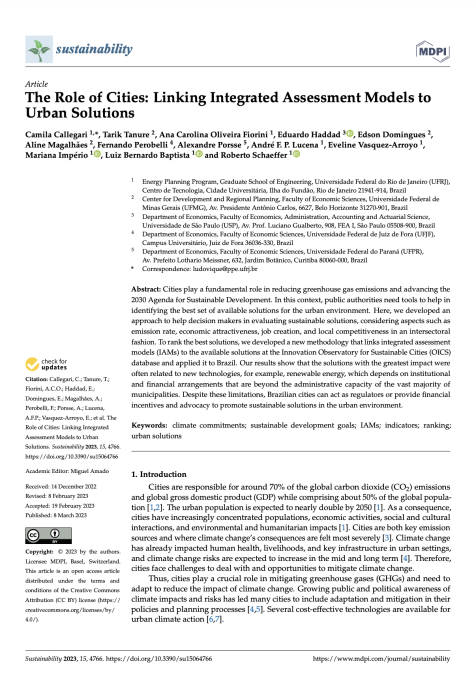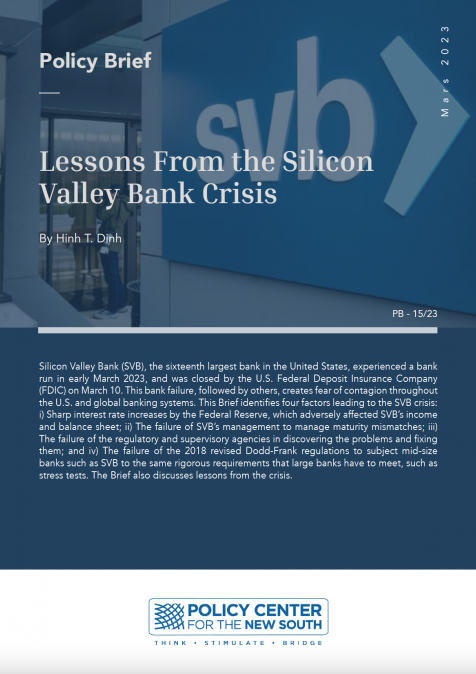Président
- Indermit Gill, économiste en chef et premier vice-président pour l'économie du développement, Groupe de la Banque mondiale
Présentateur
- Montek Singh Ahluwalia, ancien vice-président de la Commission de planification de l'Inde
Discutants
- Rim Berahab, économiste en chef, Policy Center for the New South (PCNS)
- Ingrid Gabriela Hoven, directrice générale, GIZ - Agence allemande de développement
- Lord Nicholas Stern, professeur et titulaire de la chaire IG Patel d'économie et de gouvernement, London School of Economics (LSE)
- Hasan Tuluy, associé principal, Centennial Group
RELATED CONTENT
-
AuthorsMarch 22, 2023Silicon Valley Bank (SVB), the sixteenth largest bank in the United States, experienced a bank run in early March 2023, and was closed by the U.S. Federal Deposit Insurance Company (FDIC) on March 10. This bank failure, followed by others, creates fear of contagion throughout the U.S. and global banking systems. This Brief identifies four factors leading to the SVB crisis: i) Sharp interest rate increases by the Federal Reserve, which adversely affected SVB’s income and balance shee ...
-
March 21, 2023كشفت دراسة نشرتها المنظمة الدولية للهجرة حول العاملات الموسميات بعد انتهاء مدة إقامتهن في إسبانيا والعودة إلى المغرب، أن أكثر من 83٪ من النساء يدعمن أسرة مالياً. وقد تم إجراء العديد من الدراسات حول هذا الموضوع، لتحليل الظروف المعيشية للمهاجرات الموسميات، سياقهجرتهن الدورية، أوضاعهن الاج...
-
 AuthorsCamila CallegariTarik TanureAna Carolina Oliveira FioriniEdson DominguesAline MagalhãesFernando PerobelliAlexandre PorsseAndré F. P. LucenaEveline Vasquez-ArroyoMariana ImpérioLuiz Bernardo BaptistaRoberto SchaefferMarch 20, 2023This Paper was originally published on mdpi.com Cities play a fundamental role in reducing greenhouse gas emissions and advancing the 2030 Agenda for Sustainable Development. In this context, public authorities need tools to help in identifying the best set of available solutions for the urban environment. Here, we developed an approach to help decision makers in evaluating sustainable solutions, considering aspects such as emission rate, economic attractiveness, job creation, a ...
AuthorsCamila CallegariTarik TanureAna Carolina Oliveira FioriniEdson DominguesAline MagalhãesFernando PerobelliAlexandre PorsseAndré F. P. LucenaEveline Vasquez-ArroyoMariana ImpérioLuiz Bernardo BaptistaRoberto SchaefferMarch 20, 2023This Paper was originally published on mdpi.com Cities play a fundamental role in reducing greenhouse gas emissions and advancing the 2030 Agenda for Sustainable Development. In this context, public authorities need tools to help in identifying the best set of available solutions for the urban environment. Here, we developed an approach to help decision makers in evaluating sustainable solutions, considering aspects such as emission rate, economic attractiveness, job creation, a ... -
AuthorsMarch 20, 2023The United Nations Security Council (UNSC)’s adoption of Resolution 1325 on October 31, 2000 was one of its most pathbreaking decisions, as for the first time, it was recognized that women’s participation was key to resolving conflicts and securing peace. Since then, UNSCR 1325 has often been described as one of the crowning achievements of the global women’s movement. This paper analyzes Morocco’s approach to peace and security, by understanding how the Kingdom has implemented UNSC ...
-
Rim Berahab & Marc-Antoine Eyl-MazzegaMarch 17, 2023This podcast explores the challenge of balancing the need for energy with the urgent necessity of reducing greenhouse gas emissions to combat climate change. It delves into the complex is ...
-
March 16, 2023Dans cet épisode, Gilles Yabi, directeur exécutif du West Africa Think Tank (WATHI), analyse dans le contexte actuel les rôles pour la société civile dans la résolution de conflits (Mali, Burkina Faso). Il propose aussi des mécanismes d’engagement dans un contexte d’instabilité politiqu...
-
 AuthorsZakaria ElouaourtiMarch 15, 2023The aims of this article were twofold. First, to tackle the issue of convergence from an analytical point of view by presenting the mathematical developments of the main economic growth models, which emphasized that the convergence of African economies is conditional to the investment level in the early stages of physical capital accumulation. As the latter increases, the convergence of African economies is determined by other factors (investment in research and development (R&D ...
AuthorsZakaria ElouaourtiMarch 15, 2023The aims of this article were twofold. First, to tackle the issue of convergence from an analytical point of view by presenting the mathematical developments of the main economic growth models, which emphasized that the convergence of African economies is conditional to the investment level in the early stages of physical capital accumulation. As the latter increases, the convergence of African economies is determined by other factors (investment in research and development (R&D ... -
March 14, 2023The Policy Center for the New South in collaboration with the Center for Corporate Responsibility and Sustainability, organize a webinar on the Institutional Framework Conditions for the Promotion of Private Sector Capacity Development (CD) for Agricultural Innovation in Morocco. The we...
-
Badr Mandri & Akram ZaouiMarch 14, 2023...
-
AuthorsMarch 13, 2023Les pays membres du FMI (Fonds monétaire international) ont décidé en 2021 de créer une nouvelle tranche de DTS pour une somme équivalente à 650 milliards de dollars. En appliquant les règles habituelles du Fonds, l’Afrique prise globalement n’en recevrait qu’une faible part (33 milliards). C’est pourquoi un certain nombre de pays avancés ont proposé de reverser à l’Afrique une part de leur nouvelle allocation de DTS, afin que le continent africain reçoive au total 100 mi ...






